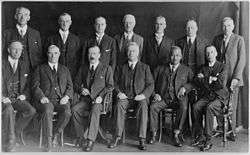United Government of New Zealand

The United Government of New Zealand was the government of New Zealand from 1928 to 1931, defeating the long-lived Reform Government. The United Party had been formed in 1927 from the remnants of the Liberal Party under Sir Joseph Ward, who had made a political comeback. They did not manage an outright win, but formed a government with Labour Party support. However, Ward was in poor health and was eventually succeeded by George Forbes. The new cabinet was notable for its inexperience, with four ministers not having sat in the House of Representatives previously.[1]
Significant policies
Economic
During the election campaign, Ward startled both his supporters and his audience by promising to borrow £70 million in a year to revive the economy; while this is believed to have been a mistake caused by Ward's failing eyesight, or was intended to be £70 million over eight to ten years, borrowed at £6 to £8 million per year (possibly a sympathetic amendment by the newspaper),[2]:100–101 it was popular with the electorate. Labour lost two urban seats: Auckland East (John A. Lee) and Grey Lynn (Fred Bartram), and many town workers and unionists must have heard "the musical chink of the seventy million". ... More by accident than design United seems to have manage to recreate to some extent the old Liberal combination of urban worker and rural support. In the circumstances it was epheremal.[2]:103 Chapman says that it is now clear that Ward inadvertently substituted 'seventy' for 'seven' when reading out the amount he would borrow in the first twelve months, and the correction to seventy millions spread over ten or eight years actually represented a shade less than Reform had already raised. But Reform's tactic of emphasizing the larger amount backfired as many voters did not share Reform's financial orthodoxy. Ward amended the loan scheme in his final address in Dunedin to raise the sixty million portion for settlers by issuing bonds over the counter like packets of tea, and said that United would vote with Labour to oust the (Reform) Government. The resulting three-party vote astounded everyone, and was similar to 1919.[3]
Formation
Defeat
Electoral results
| Election | Parliament | Seats | Total votes | Percentage | Gain (loss) | Seats won | Change | Majority |
|---|---|---|---|---|---|---|---|---|
| 1928 | 23rd | 80 | 228,438 | 30.20% | 27 | +16 | ||
| 1931 | 24th | 80 | 396,004 | 55.4% | 51 | -3 | 11 | |
Prime ministers
The government was led by Sir Joseph Ward from 1928 to 1930, and then George Forbes from 1930 to 1931. Wilson gives the dates of office-holding as 10 December 1928 to 28 May 1930 for the Ward Ministry, and 28 May 1930 to 22 September 1931 for the Forbes Ministry.
- Prime Ministers of the United Government
-
.jpg)
Joseph Ward
served 1928-1930 -

George Forbes
served 1930-1935
Cabinet ministers
| Ministry | Minister | Term(s) |
|---|---|---|
| Attorney-General | Thomas Sidey | 1928–1931 |
| Minister of Agriculture | George Forbes | 1928-1930 |
| Alfred Murdoch | 1930-1931 | |
| Minister of Customs | William Taverner | 1928-1930 |
| George Forbes | 1930-1931 | |
| Minister of Defence | Thomas Wilford | 1928–1929 |
| John Cobbe | 1929–1931 | |
| Minister of Education | Harry Atmore | 1928–1931 |
| Minister of Finance | Joseph Ward | 1928–1930 |
| George Forbes | 1930–1931 | |
| Minister of External Affairs | Joseph Ward | 1928–1930 |
| George Forbes | 1930–1931 | |
| Minister of Health | Arthur Stallworthy | 1928–1931 |
| Minister of Immigration | John Cobbe | 1928-1930 |
| Sydney George Smith | 1930-1931 | |
| Minister of Industries and Commerce | John Cobbe | 1928-1929 |
| James Bell Donald | 1929-1930 | |
| Philip De La Perrelle | 1930-1931 | |
| Minister of Internal Affairs | Philip De La Perrelle | 1928-1931 |
| Minister of Justice | Thomas Wilford | 1928–1929 |
| Thomas Sidey | 1929–1930 | |
| John Cobbe | 1930–1931 | |
| Minister of Labour | Bill Veitch | 1928-1930 |
| Sydney George Smith | 1930-1931 | |
| Minister of Lands | George Forbes | 1928-1930 |
| Alfred Ransom | 1930-1931 | |
| Minister of Marine | John Cobbe | 1928-1930 |
| James Bell Donald | 1930-1931 | |
| Minister of Mines | Bill Veitch | 1928-1930 |
| Alfred James Murdoch | 1930-1931 | |
| Minister of Native Affairs and of Cook Islands | Apirana Ngata | 1928–1931 |
| Postmaster-General and Minister of Telegraphs | James Bell Donald | 1928-1931 |
| Minister of Public Works | Alfred Ransom | 1928–1930 |
| William Tavener | 1930–1931 | |
| Minister of Railways | William Taverner | 1928–1930 |
| Bill Veitch | 1930–1931 | |
| Minister of Stamp Duties | Joseph Ward | 1928–1930 |
| George Forbes | 1930–1931 | |
See also
Further reading
- Wilson, James Oakley (1985) [First published in 1913]. New Zealand Parliamentary Record, 1840–1984 (4th ed.). Wellington: V.R. Ward, Govt. Printer. OCLC 154283103.
References
- ↑ Undiplomatic Dialogue: Letters between Carl Berendsen and Alister McIntosh 1943-52 edited by Ian McGibbon page 219 note 2 (1993, Auckland University Press) ISBN 1-86940-095-X
- 1 2 Brown, Bruce The Rise of New Zealand Labour (1962, Price Milburn, Wellington).
- ↑ Chapman R. M. The Political Scene 1919-1931 (1969, New Zealand History Topic Book by Heinemann), pp. 50–54.